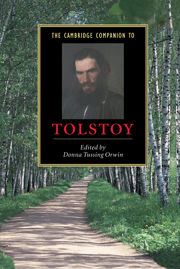Book contents
- Frontmatter
- Chronology
- Introduction
- Part 1 The three novels
- Part 2 Genres
- 4 Tolstoy as a writer of popular literature
- 5 The long short story in Tolstoy’s fiction
- 6 Tolstoy staged in Paris, Berlin, and London
- Part 3 General topics
- Guide to further reading
- Index to Tolstoy’s works and characters
- Generel Index
6 - Tolstoy staged in Paris, Berlin, and London
from Part 2 - Genres
Published online by Cambridge University Press: 28 May 2006
- Frontmatter
- Chronology
- Introduction
- Part 1 The three novels
- Part 2 Genres
- 4 Tolstoy as a writer of popular literature
- 5 The long short story in Tolstoy’s fiction
- 6 Tolstoy staged in Paris, Berlin, and London
- Part 3 General topics
- Guide to further reading
- Index to Tolstoy’s works and characters
- Generel Index
Summary
Overshadowed by his great novels, Tolstoy’s eight plays written from 1864 to 1910 have not won him a reputation as an outstanding dramatist. They are a motley collection, ranging from two farcical comedies, An Infected Family (1864) and The Nihilist (1866), that mocked the progressive intelligentsia of their time, to the two-act moral tract, The Cause of it All (1910), that railed against the evil of hard liquor and extolled the milk of human kindness. Two other, more substantial didactic dramas, The Live Corpse and The Light Shines in the Darkness, were worked upon in the 1900s but published only posthumously. The unpublished plays of the 1860s, however deficient their stagecraft, had anticipated a play that immediately won a place in the Russian repertoire. This was The Fruits of Enlightenment (1889) which, like The Nihilist, was designed as a romp to divert family and friends during long winter evenings on Tolstoy’s country estate at Iasnaia Poliana. The play’s barbs were aimed at Moscow high society, deluded by the fashion for parlor spiritualism, whose pretensions were pricked by the arrival from the provinces of a trio of peasants, desperate to buy land from their absentee landlord. Tolstoy’s dramatic touch was now surer; he contrived a happy ending as the mischievous housemaid Tania tricked her master into signing over the land at a rigged spiritualist seance. After its domestic première at Iasnaia Poliana on December 30, 1889, The Fruits of Enlightenment was given a public performance in Tula and in 1891 it was produced in Moscow by the young Stanislavsky who was embarking on his career as a director.
- Type
- Chapter
- Information
- The Cambridge Companion to Tolstoy , pp. 142 - 158Publisher: Cambridge University PressPrint publication year: 2002

